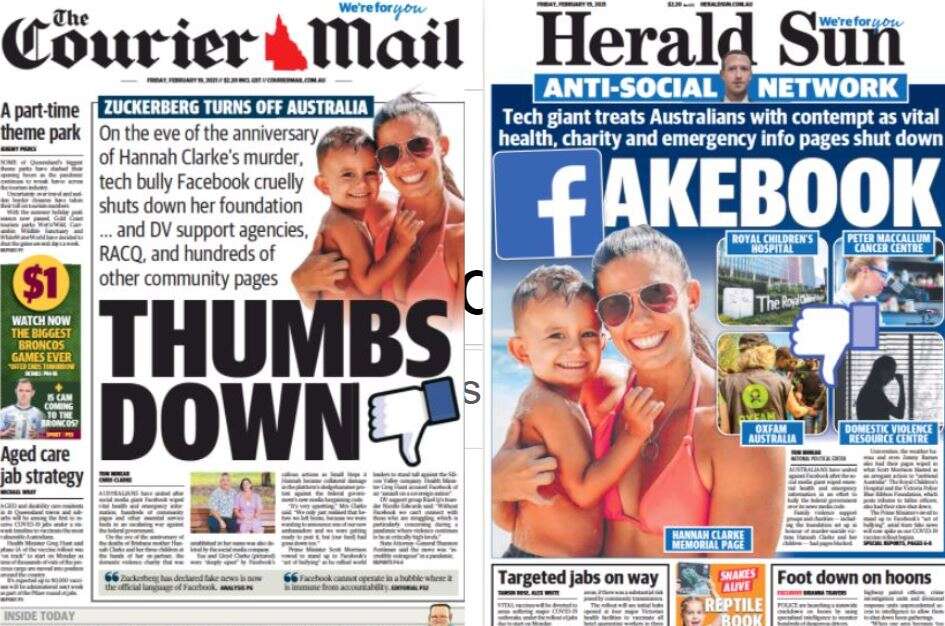
Facebook has agreed to lift its ban on news content in Australia after reaching a deal with the government over changes to the News Media Bargaining Code which could become law this week.
Facebook blocked Australian news from its platform on 18 February to avoid being subject to the new code which would have required it to submit to binding arbitration if it could not reach deals with news publishers over use of their content.
The move prompted a global backlash, with Press Gazette describing it as “abrupt, crude petulant and short-sighted“. It was seen by many as a test of power between one tech company and a nation-state. In addition to newspapers, many government and public service sites were blocked.
Facebook Australia and New Zealand managing director William Easton said: “After further discussions, we are satisfied that the Australian government has agreed to a number of changes and guarantees that address our core concerns about allowing commercial deals that recognise the value our platform provides to publishers relative to the value we receive from them.
“As a result of these changes, we can now work to further our investment in public interest journalism and restore news on Facebook for Australians in the coming days.”
Campbell Brown, the former journalist who is Facebook’s vice president for Global News Partnerships, hinted that the tech giant could block news content again in future:
“After further discussions with the Australian government, we have come to an agreement that will allow us to support the publishers we choose to, including small and local publishers.
“We’re restoring news on Facebook in Australia in the coming days. Going forward, the government has clarified we will retain the ability to decide if news appears on Facebook so that we won’t automatically be subject to a forced negotiation.
“It’s always been our intention to support journalism in Australia and around the world, and we’ll continue to invest in news globally and resist efforts by media conglomerates to advance regulatory frameworks that do not take account of the true value exchange between publishers and platforms like Facebook.”
The move means the restoration of plans to pay publishers for content to appear in the Facebook News tab in Australia. But it means Facebook is now free to cut the deals it wants to with publishers and forced arbitration looks like a distant threat.
Facebook has already struck cash-for-content deals with key leading publishers in the UK and US.
[Read more: US publishers happy with cash-for-content deal from Facebook- but say project is a ‘PR move’ ]
The amendments to the News Media Bargaining Code, already agreed by Australian lawmakers, give Google and Facebook an opt-out if they can show the government they have struck satisfactory deals outside of it.
In the event the government decides to enforce the code the tech giants will have one month’s notice.
An additional two-month mediation period has also now been added to the code to give tech companies more time to broker agreements with news publishers.
Google threatened to quit Australia in protest at the code but has now instead struck deals with a number of publishers for their content to appear on the Google News Showcase.
Facebook Australia deal: What it means (Press Gazette comment)
Facebook and Google are seeking to stuff the protesting mouths of Australian publishers with cash and have ensured that (for the moment) they control cash-for-content payments.
In exchange, the pair will continue to enjoy the fruits of their monopoly positions in search and social media advertising respectively.
The News Media Bargaining Code has been a shot across their bows and means that payments to publishers globally are likely to be inflated to keep them on side.
But this is a short-term fix. In the UK the pair are reckoned to take in excess of £10bn a year in advertising revenue (ten times the amount made by the newspaper, magazine and online news publishing industry).
Their investment in supporting evidence-backed journalism which enhances communities will need to be significant if they are going to keep enjoying their vast revenue. They will also need to continue to invest significant sums in moderation and curation to stop their platforms from amplifying toxic misinformation.
Email pged@pressgazette.co.uk to point out mistakes, provide story tips or send in a letter for publication on our "Letters Page" blog
